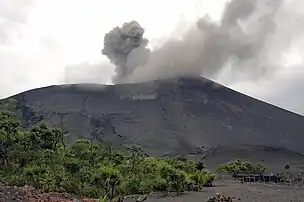Cities
Tanna is dominated by small villages, but there are some larger communities scattered around the island.
- 🌍 Ireupuow
- 🌍 Lenakel
- 🌍 Lowanatom
- White Grass
- 🌍 White Sands (Sulphur Bay)
Other destinations
Understand
Location
Tanna is located southwest of Aniwa. To the south is the island of Aneityum, and to the north is Erromango.
It is 40 kilometres (25 miles) long and 19 kilometres (12 miles) wide, with a total area of 550 square kilometres (212 square miles). Its highest point is the 1,084-metre (3,556-foot) summit of Mount Tukosmera in the south of the island.
The south of the island has the most rugged terrain, with the flattest terrain near the center of the island and along parts of the east coast.
History
Tanna was first settled about 400 BC by Melanesians from the surrounding islands. The glowing light of Mount Yasur attracted James Cook, the first European to visit the island, in August 1774, where he landed in an inlet on the southeastern tip of the island that he named Port Resolution after his ship HMS Resolution. He gave the island the name of Tanna, probably from the local name for earth, tana in the Kwamera language.
In the mid-1800s, John Paton worked to convert the island to Christianity, but some of the tribal leaders drove him off the island. However, over time, the island slowly converted to Christianity.
A secessionist movement began in the 1970s, and the Nation of Tanna was proclaimed on 24 March 1974. While the British were more open to allowing its holdings in Vanuatu to achieve independence, it was opposed by the French colonists and finally suppressed by the Anglo-French Condominium authorities on June 29, 1974.
In 1980, there was another attempt to secede, declaring the Tafea Nation on 1 January 1980, its name coming from the initials of the five islands that were to be part of the nation (Tanna, Aniwa, Futuna, Erromango and Aneityum). British forces intervened on 26 May 1980, allowing the island to become part of the newly independent nation of Vanuatu on 30 July 1980.
.jpg.webp)
Climate
The Tanna region has a tropical climate, although the weather can vary dramatically. For example, Tanna and nearby Erromango were devastated by cyclone Pam in mid-March 2015, with reports of an unknown number of deaths, complete destruction of the island’s infrastructure and permanent shelters, and no drinking water. Following this, an El Niño-spurred drought further impacted on the people of Tanna.
Get in
By air
- 🌍 Whitegrass Airport (TAH IATA Tanna Airport) (south of the village). Flights from Port-Vila. Whitegrass Airport is located approximately 132.9 miles (213.9 km) southeast of Port-Vila and about 258.7 miles (416.3 km) northeast of Dumbéa. The airport has a small terminal building and handful of support structures at the airport. The airport is reached by car or van and has a small parking area behind the terminal. A paved road provides access to west side of the island and to the settlement of Lowanatom to the south.
By boat
Cruises regularly pass through the region, but there are no ports or proper places for boats to moor along the coastline of Tanna. The best location for boats to moor is at Lenakel.
Get around
Beach Road goes around much of the island. It connects White Grass, Lenakel, and loops around to the White Sands region.
See and do
All of Tanna's main attractions are in two specific regions: White Sands and White Grass. White Grass has the most attractions, including Blue Cave and some snorkeling locations. Mount Yasur, however, is in the far east of the island, near White Sands. Just don't get too close to the volcano - it erupts regularly.
- 🌍 Blue Holes and caves. There are some interesting attractions near White Grass. These include two attractions called "Blue Hole", a cavern, and a larger cave called "Blue Cave".
- 🌍 Mount Yasur. On the east side of the island, Mount Yasur is probably Tanna's main attraction. Yasur is an active volcano - it erupts every few minutes. There are also some interesting rock formations on the north side of the volcano. Protect yourself (breathing mask, protection glasses…) and your camera (rain sleeve, filter…) as the summit is very windy and any exposed part of your body will be covered in dust ashes.
 Mount Yasur in eastern Tanna
Mount Yasur in eastern Tanna
Eat
The seaside town of Lenakel is probably the best location for restaurants and bars. There are three restaurants, including one that overlooks a marina. There are also a couple restaurants along Tanna's east coast. The island is one of the most fertile in Vanuatu and produces kava, coffee, coconut, copra, and other fruits and vegetables.
Drink
Most of the bars in the region are kava bars, which use kava to make drinks; the drink produced has sedative, anesthetic, euphoriant, and entheogenic properties. Kava is consumed throughout the Pacific Ocean cultures of Polynesia, including Hawaii, Vanuatu, Melanesia and some parts of Micronesia for its sedating effects.
Stay safe
Although moderate occasional consumption of diluted kava beverage has been deemed safe, chronic frequent use of kava bears significant risk of skin disease and liver damage, as well as the potential for adverse effects on other organ functions and untoward interactions with prescribed drugs.
Go next
- Aniwa - smaller island to the east